In Developing The Leader Within You Summary by John C. Maxwell, you learn how you can develop the traits of a great leader and contribute to the development of people and the organization.
Developing The Leader Within You Summary (PDF)
In this book summary, I’ll share the best lessons from this book.
Alrighty, so without further ado…
Let’s dive right in!
Best Tools for Bibliophiles
- Listen to your Favorite Books on The Go: Try Audible and Get Up To 2 Free Audiobooks | Get 3 Free Audiobooks
- Read over 2 million e-books on any device: Sign up for 30 days free trial of Kindle Unlimited and read your favorite titles.
- Get free 2-day shipping of your favorite books and stream premium TV shows on Amazon Prime: Sign up for 30 days free trial of Amazon Prime.
- I use Notion to take reading notes, plan everything, and run all my businesses. (Notion is my Second Brain 🤯): Get Notion for free for personal use (paid for teams/businesses)
Lesson #1: Understand the true definition of leadership
We keep hearing this “leadership” word all the time.
But never truly understand the deeper meaning of it.
Thanks to the author, I was able to understand leadership in detail.
And through this summary, so will you.
So what is leadership?
What does it mean?
Let’s discuss.
Generally, leadership means the quality to lead people.
Often a leader has the ability to influence his followers.
The author says:
“Leadership is influence.”
John Maxwell
This is the simplest definition of leadership you would have ever heard.
If you can’t influence people, you are no leader.
And if a person influences you, it means that you are a follower of that person.
The thing is:
An influencer or leader bears a great responsibility.
“With great power comes great responsibility.”
Not only is a leader responsible for himself, but others too.
That’s the main reason that not everyone can be a great leader.
Leadership isn’t just a title. It’s much more than that.
Most people think that if you are in a high-authority position, you are a leader. That’s not true at all.
Just having a title is not leadership.
You can’t become a great leader unless you deserve your followers’ respect.
You can’t just acquire a title one day and declare yourself a leader.
People will obey you if you are an authority, but they won’t think of you as a leader.
It won’t be wrong to say that leadership is earned.
Lesson #2: Everybody is a leader, but not all leaders are great.
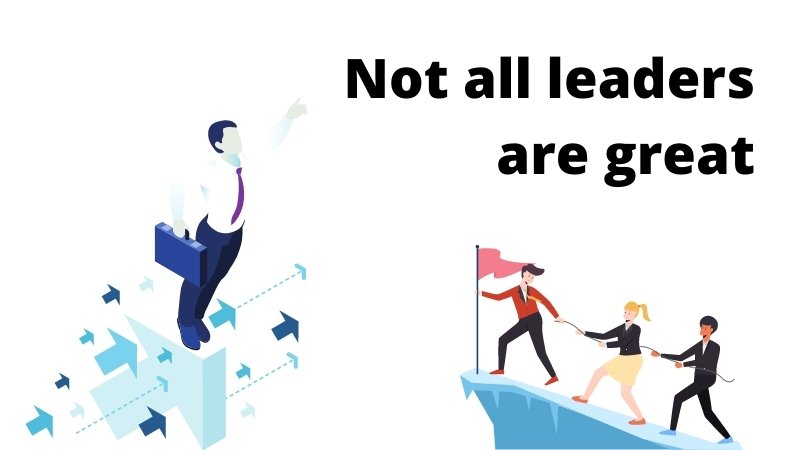
When we say not everybody can be a leader, it means that not everyone can be a great leader.
But if you notice:
We all influence other people to a varying degree.
Some people can impact millions of others. While some can’t even influence more than two people.
Also, in What To Say When You Talk To Yourself, we learned that we are constantly being programmed by others and are programming others too.
We are social animals.
We build bonds with other people and trust them.
It’s hard to be in harmony with people without trusting them.
Just imagine:
If everybody is influencing everyone, then who is the real leader?
We have many leaders, but only a few are game-changers.
Using the 80-20 rule, only 20% of the leaders take 80% of the decision in an organization.
Usually, organizations are hierarchical:
People at the lower level of the organization are led by the leaders above them. And those leaders are further led by top leaders.
But are all of them worthy of being called great leaders? Not really.
As we just discussed above, merely obtaining an authoritative position or title in an organization doesn’t make you a great leader.
You have to earn the trust and respect of your followers.
The author says:
For a leader to have significant influence, your followers must confide in you and your ideas.
And to develop such a bond, it takes time.
Sometimes, it takes years to develop that trust.
It’s not easy.
A leader has to pay the price to become great.
A great leader is also a great communicator. At the top level, communication happens through emails. But what if your emails have grammatical mistakes? It would leave a bad impression, right?
Try Grammarly for free and impress your colleagues with a clear message.
✅Visit Grammarly: Register your free account on Grammarly and install its extension to start using it.
Lesson #3: Not every follower is the same.
The truth is:
Even if you are a great leader, not everybody will follow you.
You’ll have some followers who will put your ideas above everything else and blindly trust you.
At the same time, you’ll also have followers who will always be suspicious of your choices.
But if you are truly remarkable, they will eventually accept you as their leader.
The point is:
Not all followers are created equal.
Here is what you can do to gain the trust of those who don’t like you:
You can find small influencers within the organization and give them the responsibility to earn the trust of those you want to influence.
Or you can informally collect knowledge about what you are doing wrong and why some people don’t like your decisions.
Most of such problems can often be solved by proper communication.
If you notice, great leaders are often great communicators.
Just think about it:
Would you ever follow or be led by a person you don’t understand.
The chances are pretty slim, right?
Unless you genuinely believe in a leader’s ideology, you don’t care.
Or do you?
Nevertheless, there will always be people who won’t like you – no matter how good you are at leading people and helping them grow and develop.
Remember:
Not all followers are the same.
Lesson #4: A great leader must know how to prioritize and organize.
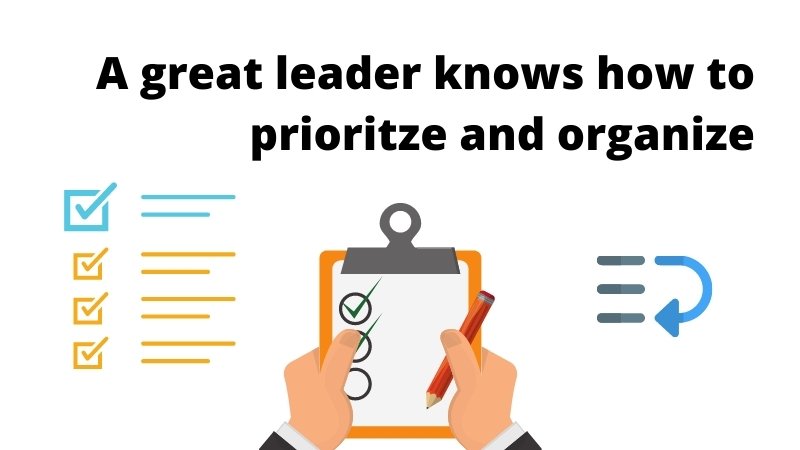
Leadership is about managing people.
Do you think a person who can’t even manage his daily tasks can be a great leader? Hell no!
A leader must be able to organize and prioritize his goals.
When you are leading many people, it often becomes overwhelming to choose between the plethora of choices available to you at any time.
That’s what separates great leaders from good leaders.
Great leaders don’t get paralyzed after looking at so many options. They can figure out and execute what’s essential.
That’s why they are great, right?
Sometimes, what happens is that what we think is “important” turns out to be “not that important.”
Most people make this mistake.
Leaders are humans too. They also make mistakes.
The author says:
“It’s not how hard you work; it’s how smart you work.”
If you spend most of your time being busy and not achieving anything, you are not a good leader.
A leader should be smart enough to lead other people.
Also, people try to model what their leaders do.
Imagine the blunder it would cause in every follower’s life if they start copying their leader who isn’t intelligent enough.
Pretty hopeless, wouldn’t it?
If you work in an organization and wish to grow it, start organizing yourself first. Everything else comes after that.
Prioritize your key objectives and delegate them to suitable leaders.
Lesson #5: A leader must be credible and trustworthy.
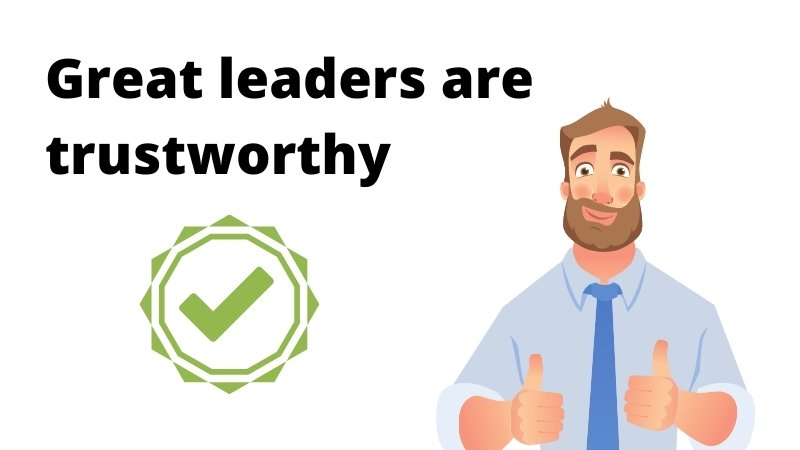
If a person is not credible, it’s hard to follow him.
So for a leader to be great in the eyes of his people, he must be credible.
Credibility takes time to build.
People see through what you are.
They can sniff if you are showing a fake image of yourself.
That’s why you mustn’t pretend to be someone else.
Just be real.
As you start working towards people development, you begin gaining people’s trust.
Again, people will realize if you genuinely want to help them or not.
Trust is something that you should cherish.
Once you lose the trust of your follower, you lose him forever.
Just think:
How often have people in the authoritative position made big claims/promises and then failed to fulfill them?
A lot of them, right?
The thing is:
Don’t build fake trust.
Do something that helps people, and you won’t even feel the need to create trust among people.
An organization or a company can’t grow unless its people want it to grow.
You may get results by being the authority, but you can only create a movement when the people are passionate about achieving your organizational goals.
Only when they believe in their leader…
Only when they trust their leader…
Only when they care about their leader…
Only when they have faith in their leader… can you grow your organization fast.
Lesson #6: Great leaders solve bigger problems.
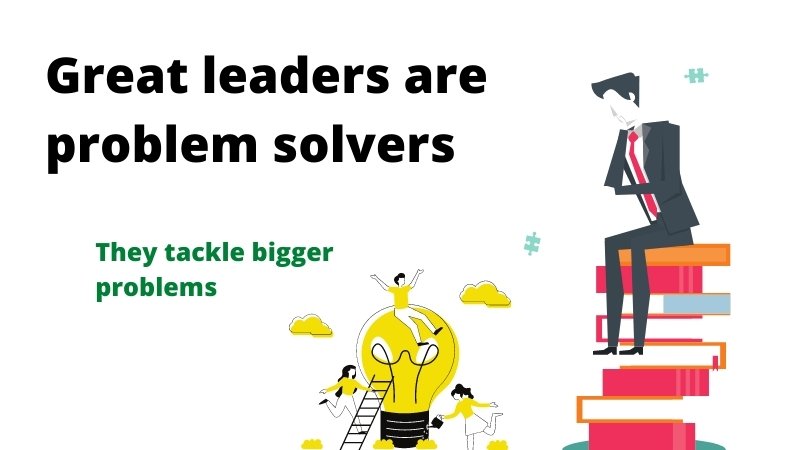
What makes a leader great is also determined by the size of the problems they solve.
In simple words:
A leader trying to fix environmental issues will probably have a more significant influence on people.
Why? Because the environment is something that affects all of us.
Plus, it’s a much bigger problem than increasing a company’s revenue. Although a company needs to generate income to survive, it’s not as important as saving the earth.
Want to become a great leader?
Alrighty.
Find a bigger problem.
And devote yourself to solving that problem.
The size of the problems you tackle determines the number of people you influence.
For example:
There is a reason why Elon Musk is a role model for many people. He has a big vision.
He is trying to solve a bigger problem.
People believe in him.
That’s what makes him a great leader.
(Okay, that was out of this book. 🙂 But I hope you got the point pretty well here.)
Another thing:
Great leaders are often able to predict problems before they even happen.
You tell me:
What’s better: Taking precautions or Taking pills after having a disease?
Taking precautions is way better than going to a doctor and taking medications after catching a disease, right?
Lesson #7: Followers do what they see their leaders do.
Once you become a leader, people start following you.
They see how you handle things.
They see what you believe in and what you actually do.
Remember? Authority and leadership have a strong influence on people.
You don’t want people to learn bad things from you, right?
So become someone they can model.
Be someone they can look up to.
It doesn’t mean that you create a fake persona of yourself.
Try to acquire the outstanding traits of the leaders like empathy, responsibility, credibility, etc.
… And you’ll do fine.
Lesson #8: The difference between good leaders and great leaders.
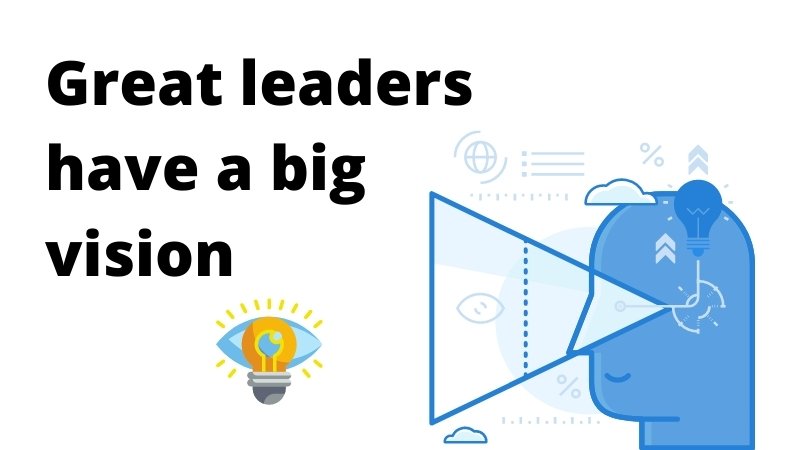
Great leaders have a broad vision.
A vision so big that it can motivate people and get them to take action.
Like:
Saving the planet.
Or making human colonies on Mars.
Got that? Alright.
The author puts it nicely:
“People don’t follow dreams; they follow the leader who has a dream.”
Reread it.
Good!
Think about all the great leaders in the past or even the present.
What do they have in common?
They all have a big vision.
People didn’t believe in Steve Jobs’s dream; they believed in Steve Jobs, who had the dream of making something great for people.
Don’t worry. I won’t be digging the history for you.
On the other hand, good leaders lead people with a narrow vision.
They don’t think broad.
They focus on immediate results, sometimes, without calculating the consequences of their decisions.
Most leaders only care about themselves. They don’t think much about people’s development.
They forget:
It’s the people who make a leader great.
In Leaders Eat Last, Simon Sinek talks about why leaders should put their people first.
He says great leaders eat last.
They prioritize people’s growth over their personal gains.
Good leaders can easily be replaced.
But great leaders are still rare and irreplaceable.
They are the real gems that influence most people on this planet.
You, too, can develop a great leader within you if you acquire all the qualities of great leaders.
Jot down the key points we discussed here.
And try to implement them one by one.
Think about how you can develop those traits within you.
Lesson #9: Great leaders focus on people development.
Russell Brunson talks about why people follow a leader in his book Expert Secrets.
In most cases, people want to have the results that their leader has.
He also says that anybody can become a leader or an expert.
So there is scope for everyone.
The condition is:
You must have some expertise.
You don’t have to be the best in your industry.
You just have to be better than most people. That’s all.
Ask yourself:
Do I have results that people would benefit from?
Can I help people reach their goals?
If you can do that, you can be a leader.
Notice:
I’m not saying that you would become a great leader.
Great leadership is learned or earned.
You may be talented at leading people by birth. It’s incredible if you have that talent. But you will only become great with experience and the right attitude.
The Key Takeaways from Developing The Leader Within You Summary
- Leadership is influence.
- We all influence others, but we all are not great leaders.
- Not all followers are the same.
- A leader must be credible and trustworthy.
- Great leaders have a big vision.
- Great leaders focus on people development.
- You need self-discipline to be a great leader.
- The right attitude is one of the most significant assets of a leader.
Learn more lessons on Leadership through book summaries on Blinkist
Blinkist is a fantastic app that gives you more than 4500 book summaries in both text and audio, which you can read or listen to anytime.
If you are an avid reader of non-fiction books, you are going to love it.
✅Get Blinkist here: Try 7-Days Risk-Free Trial
Develop The Leader Within You Review
It was a good read.
The thing I liked about this book:
The ideas are organized well in points.
Book is simple to consume.
The thing I didn’t like in this book:
Although this is an easy-to-read book with just ten chapters, most ideas have been repeated repeatedly.
It’s not such a big thing, though.
In the end, you’ll remember those ideas better.
Get this book on Amazon: Hardcover | Paperback | Audiobook
Who would I recommend this book?
I would recommend this book to a professional who has a corporate job or someone doing a business. Leadership is beneficial in those cases.
Or, if you are a student who wants to be a great leader someday and change this world for good, you should also read this book.
If we talk about how we all influence everyone without realizing it, everyone should read this book.
That way, we’ll ensure that we don’t negatively influence others.
Get this book on Amazon: Hardcover | Paperback | Audiobook
Other Recommended Book Summaries
I highly recommend that you also read below book summaries to enhance your understanding of leadership even more:
✅Book Summary: Leaders Eat Last by Simon Sinek
✅Book Summary: The 360 Degree Leader by John Maxwell
✅Book Summary: The 7 Habits Of Highly Effective People by Stephen Covey
✅Book Summary: Attitude Is Everything by Jeff Keller
People interested in this book Also Buy
[amazon box=”159995365X,1591846447,0066620996,0062367544,0593171128″ template=”table”]
Now it’s your turn
I hope you are inspired after reading Developing The Leader Within You Summary.
A wise man once said:
“Great readers become great leaders.”
You have the potential to become a leader as you showed interest in reading this summary.
You tell me now:
Which trait do you think is a must-have for a leader to be great?
Do you have any of the leadership traits?
Have you ever led a team of people?
Let me know in the comments below.
And as always, if you enjoyed this summary, share it with your friends and family members.
Want to consume more insightful, power-packed content like this in the future?
Subscribe to the weekly email newsletter.
Subscribe to YouTube channel for animated video books.
Try Amazon’s Audible 30-days Free Trial and Get 2 Audiobooks for free.

Thankyou , appreciate will recommend and share, keep up the great work.
Glad to help.